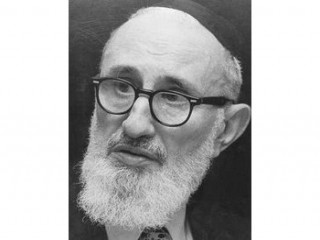
Joseph B. Soloveitchik biography
Date of birth : 1903-02-27
Date of death : 1993-04-08
Birthplace : Pruzhan, Poland
Nationality : Polish
Category : Science and Technology
Last modified : 2011-08-11
Credited as : Jewish theologian, philosopher,
The Jewish theologian/philosopher Joseph Baer Soloveitchik was able to use his extensive knowledge of rabbinical tradition and of secular and non-Jewish thought to illuminate both the contemporary Jewish situation and the circumstances of modern man in general. During his lifetime, he ordained over 2000 rabbis.
Joseph Baer Soloveitchik was born in 1903 in Pruzhan, Poland, into one of the most distinguished rabbinical families in Eastern Europe. His grandfather Rav Chaim Soloveitchik had pioneered a new method of talmudic study and had thereby created one of the main religious and intellectual streams within modern Orthodox Jewry. After receiving an excellent traditional Jewish education at home under the tutelage of his father, Rav Moses Soloveitchik, the young Soloveitchik at the age of 20 took the dramatic action, given his family background, of going to Germany to study at the University of Berlin. And it was here, after nearly a decade of secular studies, that he received his Ph.D. in philosophy in 1931 for a dissertation dealing with Herman Cohen's neo-Kantian philosophical outlook. It was also here that he met and married Dr. Tonya Lewit (who died in 1967). In 1932, with doctorate in hand, he went to the United States and settled in Boston. In 1933 he began to teach rabbinics at the Rabbi Isaac Elchanan Seminary of Yeshiva University (New York City), and in 1941, following his father's death, he acceded to its head (as Rosh Yeshiva).
Soloveitchik's fame as a theologian-philosopher rested upon his unique control of the whole range of rabbinical tradition as well as the main sources of modern secular and non-Jewish thought. As few others, he was able to bring together these two disparate traditions in such a way as to illuminate both the contemporary Jewish situation and the circumstances of modern man in general. He exerted his influence in two very different ways. The first, and most important, was through his teaching at Yeshiva University, where several generations of young American Orthodox rabbis became his students and "disciples." The second was through his diverse essays, many of which have been collected into published volumes. The most important of these were Halakhic Man (English translation, 1984); Shiurei Ha-Rav (1978); On Repentance (1984); and the essays "The Lonely Man of Faith" (Tradition, 7 [Summer 1965]) and "Confrontation" (Tradition, 6 [Spring-Summer-1964]).
Soloveitchik's work is not easy to summarize because it was not presented in a systematic fashion, but its essential features can be summarized. His primary concern was to analyze—and draw subtle distinctions between—different understandings of the human condition—for example, between what he perceived to be the character of "technological" man who asked the pragmatic and scientific question "How does the cosmos function?" and "religious" man who asked rather the metaphysical question "Why is there a cosmos at all?"; or again to distinguish among "rational man," "religious man" in general, and "halakhic man" (the man who lives according to Jewish law—that is, halakah). The purpose of making such discriminations for Soloveitchik was that they reveal human-kind's complex character, a complex character which cannot ultimately be satisfied through the cultivation of only one aspect—for example, the pragmatic scientific-rational side of the human personality. The whole person, the religious-moral, as well as the intellectual-acquisitive, aspects of life require proper attention and development.
His world-view revealed deep affinities with the modern school of thought known as Existentialism. Like the existentialist philosophers he emphasized, as was indicated in the title of his most famous essay, the characteristics of "The Lonely Man of Faith," his studies were preoccupied with the themes of human anxiety, loneliness, alienation, guilt, repentance, and suffering and how these conditions were to be overcome through a personal and authentic relation to God.
He was above all else a deeply committed, profoundly learned Jew who wished to examine, explain, and justify the workings of the rabbinic tradition to modern individuals. His truly unique contribution was his halakhic orientation, his continued effort to elaborate and defend the need for the halakah (religious law) as the most appropriate means by which Jews can enter into a proper dialogical relationship with God. According to this perspective the appropriate divine-human dialogue was created when mankind willingly brings its will into conformity with the Divine Will as revealed in the Torah (the Hebrew Bible), as interpreted by the rabbinic tradition (the Halakah, religious law).
In addition to contributing to the theoretical debate over these complex theological issues, Soloveitchik also influenced American and world Jewry by his championing of Zionism and by his deep commitment to the state of Israel.
During his lifetime, Soloveitchik ordained more than 2000 rabbis. He died in his home in Brookline, Massachusetts, at the age of 90, on April 8, 1993.
















